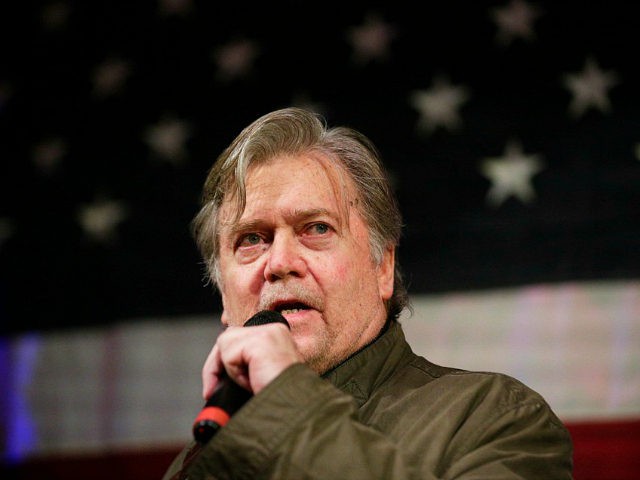Renowned Asia expert Gordon Chang believes former White House Chief Strategist Steve Bannon is “today’s Paul Revere” when it comes to his warnings about China’s economic war with the United States.
Bannon plans to field economic nationalist candidates to challenge GOP incumbent Senators and Representatives and make China a huge issue in 2018 and 2020, and Chang is bullish on Bannon’s ability to do so and put more pressure on lawmakers to rethink America’s policies on China.
In a Forbes magazine piece last week about how the “smart money” is actually on Bannon as he battles China, Chang noted that after conservative grassroots candidate Roy Moore’s victory in the Alabama GOP Senate runoff, America and the world were put on notice because the economic nationalist movement that Chang calls “The Bannon Express” has only “just left the station and is picking up steam.”
“Folks standing in its way—even the leaders of awesome communist giants—are in grave danger of getting run over,” Chang wrote.
Chang thinks Bannon is “right on the money” when he says that “China is at economic war with us.” Bannon made those remarks to CBS anchor Charlie Rose in a 60 Minutes interview.
Chang also noted that Robert Lighthizer, the U.S. trade representative, recently said that “the sheer scale” of China’s “coordinated effort to develop their economy, to subsidize, to create national champions, to force technology transfers, and to distort markets in China and throughout the world is a threat to the world trading system that is unprecedented.” Bannon also told Rose that China—“through forced technology transfer and through stealing our technology”—is “ cutting out the beating heart of American innovation.”
Regardless of whether one wants to accuse China of engaging in a “trade war,” Chang believes that China has unmistakably “been conducting a concerted campaign to injure foreign competitors.”
Now that Bannon is not in the White House, he is “free to push the administration—and the American people—in a direction not seen in the U.S. for over four decades,” according to Chang.
“Beijing, as he views it, is not a partner or friend. And although one could call the country an adversary, we should begin, I believe, to consider whether the Communist Party is an economic enemy,” he continued.
Bannon has met with everyone from Henry Kissinger to Andrew Marshall, “the Cold War strategist who served for 42 years as the director of the U.S. Department of Defense’s Office of Net Assessment, where, among other things, he anticipated America’s rivalry with China,” to get as much insight and intelligence on China as he can.
Chang noted that Bannon “has launched a movement to change the way Americans think about the Chinese state,” and “Beijing’s decades-long privileged status in Washington is about to come to a close.”
Citing a recent Bloomberg News article, Chang pointed out that after Bannon met with Kissinger, he decided that, like the Committee on the Present Danger that “helped change American thinking about the Soviet Union” during the Cold War, one had to “go outside and, like a fire bell in the night, wake up the American people.”
Chang points out that “since the Cold War, Washington’s focus in Asia has been the integration of the Chinese communist superstate into the post-war, liberal international system.” And “as a result, during these decades U.S. presidents often ended up elevating Beijing’s interests over those of America’s. In many instances, a generous Washington pursued what could be called “China First” policies.”
But Trump “changed the paradigm” in just months:
Beginning the 26th [June], the American leader “outraged” Beijing when he gave the warmest of welcomes to visiting Indian Prime Minister Narendra Modi, refused to give China a waiver and thereby dropped the country into the State Department’s worst category in its annual Trafficking in Persons report, severed Bank of Dandong from the global banking system by designating it a “primary money laundering concern,” sanctioned a Chinese shipping company and two Chinese individuals, and notified Congress of a $1.42 billion arms sale to Taiwan. Moreover, to make matters worse for Beijing, at the beginning of the following week the U.S. Navy conducted its first South China Sea freedom of navigation operation in the Trump era.
Chang wrote that Trump “cut the Chinese down to size, not putting them at the center of American policy.”
“That was a good thing. Previous U.S. presidents, like almost all other global leaders, viewed China as some magnificient presence, mostly accepting the Communist Party’s view that the Chinese capital sat at the center of the solar system,” Chang continued.
He noted that “Bannon is today’s Paul Revere” because he is “planning to make China’s forced transfer of intellectual property and other predatory practices the heart of a movement.”
According to Bloomberg News, Bannon’s “effort to steer the GOP” toward economic nationalism “will involve encouraging candidates to take hard-line positions toward China.”
“Every day we are going to be making China a huge part of the ’18 and ’20 elections,” Bannon told the outlet.

COMMENTS
Please let us know if you're having issues with commenting.